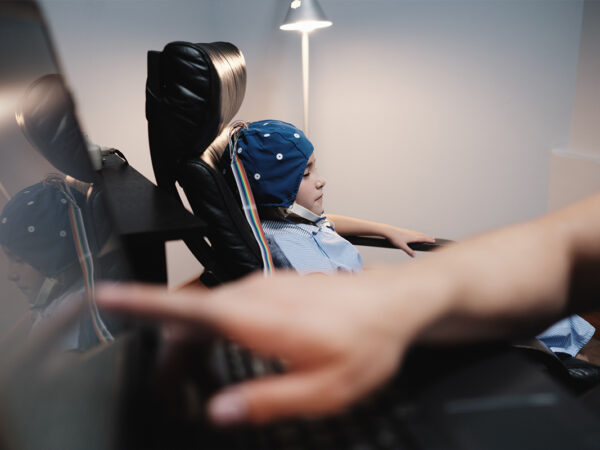Autism Spectrum Disorder
Autism spectrum disorder (ASD) is a developmental disability caused by differences in the brain. Children and adults with ASD often have challenges with social communication and interaction, as well as restricted or repetitive behaviors or interests. Additionally, individuals with ASD may have unique ways of learning, moving, or paying attention.
According to the Centers for Disease Control and Prevention (CDC), autism affects approximately 1 in 36 children in the United States. Autism does not consist of a single set of symptoms but includes many subtypes influenced by a combination of genetic and environmental factors. Autism is viewed as a spectrum, meaning each person with autism has a distinct set of abilities and difficulties. The ways in which people with autism learn, think, and problem-solve can range from highly skilled to very low functioning. Some individuals with Autism Spectrum Disorder may require significant support in their daily lives, while others may need less support and, in some cases, can function independently as members of society.
Social Communication and Interaction Skills:
Individuals diagnosed with ASD often present with difficulties in some or all of the following areas, with some of these symptoms observed as early as 9 months old.
- Eye Contact: Avoids or does not keep eye contact
- Response to Name: May not respond to their name
- Facial Expressions: Limited use of facial expressions to convey emotions
- Interactive Play: Limited engagement in interactive play, even at a young age
- Gestures: Few or no gestures, like waving goodbye
- Sharing Interests: May not share interests or show objects of interest to others
- Pointing: Limited pointing to show something interesting
- Empathy: May not notice when others are hurt or upset
- Group Play: Limited involvement in group play activities
- Pretend Play: Rarely engages in imaginative play, such as pretending to be a superhero
- Performing for Others: Limited instances of singing, dancing, or acting for others
Restricted or Repetitive Behaviors or Interests:
- Lining Up Objects: Arranging objects in a specific order and getting upset if the order is changed
- Echolalia: Repeating words or phrases repeatedly
- Consistent Play Patterns: Plays with toys the same way every time
- Focus on Parts: Intense focus on parts of objects, like wheels
- Minor Changes: Distress over minor changes in routines or environment
- Obsessive Interests: Deep, obsessive interests in specific topics
- Routines: Strong adherence to specific routines
- Self-Stimulation: Engaging in repetitive behaviors like hand-flapping or rocking
- Sensory Reactions: Unusual responses to sensory experiences, such as sounds, smells, tastes, or textures
Related Characteristics:
Many individuals with ASD have other related characteristics, including:
- Delayed Language Skills: Delayed speech or difficulty with language.
- Delayed Movement Skills: Delayed motor development.
- Delayed Cognitive Skills: Challenges in cognitive or learning skills.
- Hyperactive Behavior: Hyperactive, impulsive, and/or inattentive behavior.
- Eating and Sleeping Habits: Unusual eating and sleeping habits.
- Gastrointestinal Issues: Gastrointestinal issues such as constipation.
- Mood Reactions: Unusual mood or emotional reactions.
- Anxiety: Anxiety, stress, or excessive worry.
- Fear Responses: Lack of fear or more fear than expected.
Diagnosis of Autism:
Diagnosing autism can involve several different methods. Developmental screening is one approach, using developmental milestones checklists for early identification. Another method is a comprehensive diagnostic evaluation, which includes detailed assessments such as interviews, observations, and standardized testing. Additionally, a multidisciplinary team may be involved, bringing together specialists such as pediatricians, occupational therapists, psychologists, and speech-language pathologists to provide a thorough and accurate diagnosis.
Treatment and Support for Autism:
- Speech Therapy: To address communication challenges and improve language skills.
- Occupational Therapy: To help with sensory processing issues and improve daily living skills.
- Educational Support: Individualized Education Plans (IEPs) and specialized teaching strategies.
- Neurofeedback: A biofeedback technique that involves real-time monitoring of brain activity to help individuals learn self-regulation, which can potentially enhance communication skills.
If you or a loved one is experiencing symptoms of Autism Spectrum Disorder, please contact us to schedule an appointment or learn more about our assessment and treatment options.
INSIGHTS AND NEWS
Posts About Autism
Too Viral?: Investigating the Effects of Mental Health Content on TikTok
May 20, 2022 Blog
Starting out as an app to pass the time with dance challenges like the Renegade,...
Reap the Benefits of Neurofeedback
January 17, 2013 Blog
FOR IMMEDIATE RELEASE (Chicago, Illinois, 17 January 2012) A Neurofeedback...
TESTIMONIALS
What Clients Say
“This place is amazing our son (6 at the time) was having problems at school. Thanks to their advice our son (now almost 8) is doing SO much better. I would recommend this place to anyone even considering an assessment for their child!”
J.B.
Parent
“The tests Dr. Goldstein used were very accurate in determining the correct concerns, plus he provided excellent advice on tools and resources in moving forward. Five Stars all the way!”
E.H.
Parent
“Our teacher suggested that we test our 8 year-old and we could not be happier with the process, the staff and the outcome. This was one of the best things we could have done for our daughter.”
P.B.
Parent
“Dr. Goldstein and his staff are very professional, patient and understanding about the entire process. Our family is very grateful to have found and highly recommend Cognitive Solutions Learning Center!”
L.M.
Parent
“Dr. Goldstein and the staff at Cognitive Solutions was the best. Dr Goldstein helped my son through the extensive testing, identify and explain his learning disability, along with giving him hope for a brighter future! Thank you.”
H.P.
Parent
“After observing my son demonstrating disruptive behavior, I was advised to take him to CSLC for testing. They were able to identify issues and offer realistic strategies to put him on the path to success.“
C.J.
Parent
“We have been patients of Cognitive Solutions for years. The evaluations are thorough without taking too much away from school. We would recommend for evaluations we well as learning specialist needs.”
M.B.
Parent



